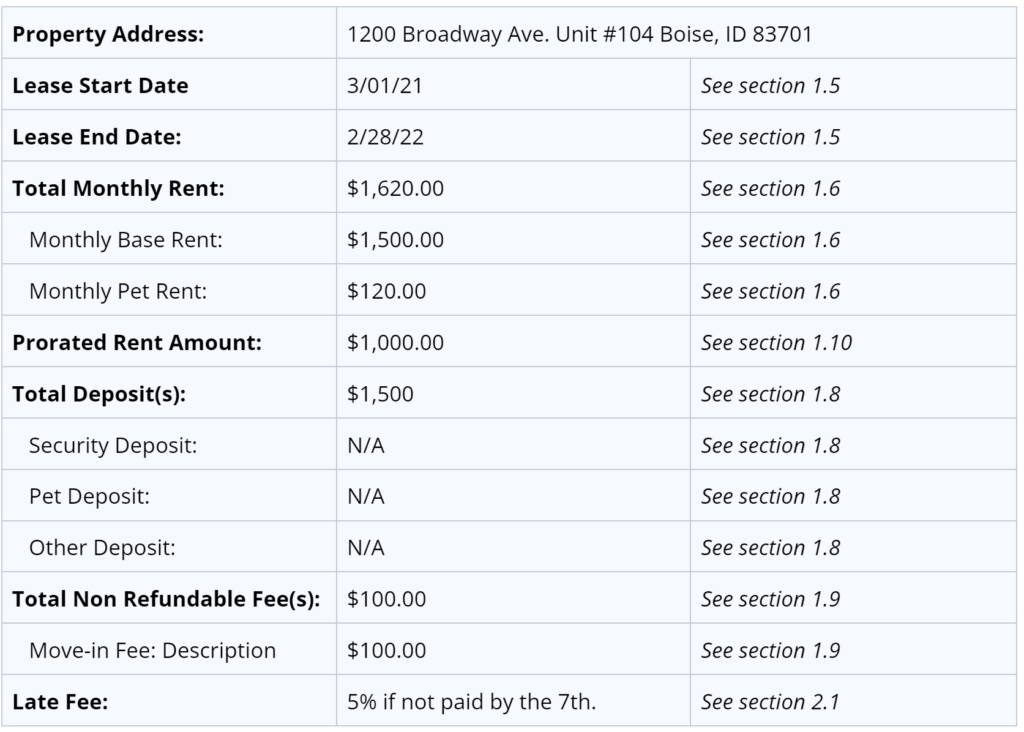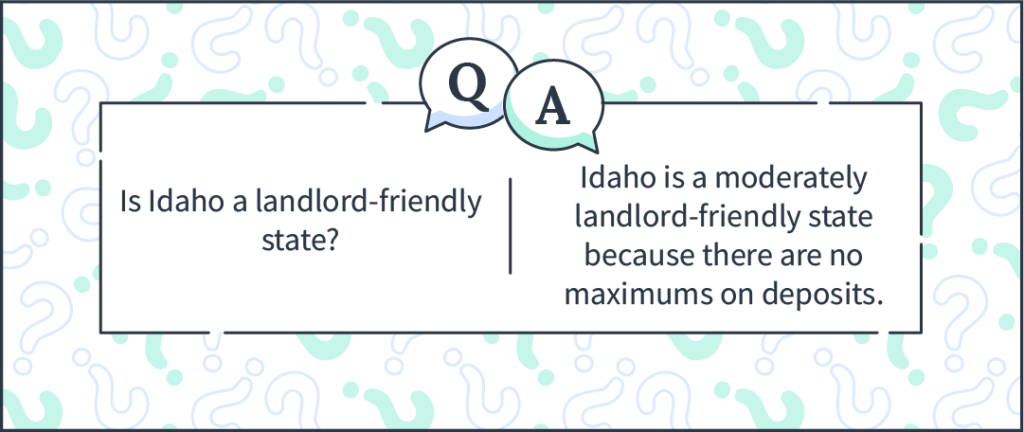Known as “the gem state”, Idaho boasts plenty of natural beauty that is drawing in new residents each year. Beyond the outdoor enchantment, Idaho also has an extremely low amount of crime. Paired with a low cost of living and a strong economy, Idaho is one of the best states to invest in rental property right now.

Laws that impact the rental market, landlords, and tenants are constantly being decided in states. Make sure you know what’s on your ballot – find Idaho voting information.

Idaho Tenants’ Rights and Landlord Responsibilities
- Must return security deposit within 21 days
- Required to make repairs within three days
- Give a 15-day notice before raising rent
- No minimum notice for entry
When it comes to Idaho rental laws, there are a few specifics landlords need to know:
- Security Deposit– Idaho law does not limit what a landlord can charge for the security deposit. They must, however, return the deposit within 21 days of the tenant moving out.
- Making Repairs– It is the landlord’s responsibility to keep the rental in safe and healthy living conditions. If the landlord fails to do so, the tenant may deliver them a written notice of what needs to be repaired or replaced. The landlord then has three days to make the repairs, and if they fail to do so, the tenant may sue the landlord.
- Raising Rent– Landlords may only increase the rent after the lease has ended. For month-to-month renters, they must give a 15-day notice before raising the rent.
- Notice for Entry– Idaho law does not specify a notice period before the landlord may enter the rental property.
Build an Idaho lease agreement in less than 15 minutes.
Idaho Lease Agreement Example
There are three sections to a residential lease agreement. The first section outlines the custom details of the contract, such as who’s involved and for what address. Here’s an example Idaho lease agreement listing details found in Section 1:
Idaho Rental Laws and Tenant Responsibilities
- Tenants have three days to pay rent after they receive a written notice
- Must give a month notice before terminating a lease
- Renters have 30 days to claim abandoned property
- Tenant is required to maintain property
- Overdue Rent– If a tenant fails to pay rent on time, the landlord may supply them with a notice that gives them three days to pay the rent. After these three days, the landlord may file for eviction. Idaho law does not limit what a landlord may charge for late fees.
- Lease Termination– If a tenant decides to terminate their lease for a year-to-year lease or month-to-month lease, they must supply the landlord with a one-month notice.
- Abandoned Property– If a tenant moves out and leaves behind personal property, the landlord must send the ex-tenant a written notice and 30 days to claim the items. If the tenant fails to claim the property, the landlord may dispose of it in any way they deem acceptable.
- Tenant Responsibilities– Tenants are responsible for maintaining a safe and habitable living environment, including keeping fixtures clean and sanitary and making minor repairs when necessary.
Idaho Renters’ Rights FAQ
Below are brief answers for some of the most commonly-asked questions when it comes to landlord-tenant law in Idaho.
Can You Withhold Rent in Idaho?
Tenants can’t withhold rent. A tenant cannot deduct the cost of repairs from their rent if landlord does not repair, their only remedy is to sue the landlord.
How Long Does it Take to Evict a Tenant in Idaho?
The process to evict a tenant in Idaho can take anywhere from one week to a few months depending on the type of eviction.
Is Idaho a Landlord-Friendly State?
Idaho is a moderately landlord-friendly state. There are no maximums on security deposits or late fees, and tenants are unable to withhold rent unless it is for repairs.
What is the Eviction Process in Idaho?
For an eviction because of failure to pay rent, illegal activity, or violating the lease terms, the landlord must give the tenant a written notice and three days to cure the violation. Once the eviction is filed, the tenant must be served within one to five days. After being served, the court date must be scheduled to take place within 12 days. If the judge rules in favor of the landlord, a writ of restitution may be served within a few hours to a few days depending on the reason for eviction. Once this is served, the tenant may be required to move out immediately.
How Much Notice Does a Landlord Have to Give a Tenant to Move Out in Idaho?
Landlords must give tenants a one-month notice to move out. For fixed lease tenants, landlords do not have to supply a notice.
Due Diligence and Idaho Rental Laws
TurboTenant has utilized many municipal sources along with official state statutes in order to compile this information to the best of our ability. However, local laws are always in flux, and landlords and tenants alike should be sure to do their due diligence and consult legal help when it’s needed. We hope the following list can serve as a valuable resource and allow you to succeed as a landlord or tenant in Idaho. Be sure to take proper precautions when it comes to finding the top candidates for your unit by utilizing our online rental application and tenant screening services.
Disclaimer: TurboTenant, Inc does not provide legal advice. This material has been prepared for informational purposes only. All users are advised to check all applicable local, state, and federal laws and consult legal counsel should questions arise.

Unlimited Everything.
Create a single Idaho lease agreement, or subscribe and receive unlimited lease agreements, landlord forms pack, and e-signs for a simple annual fee. Be confident with all the legal forms and tools you need as a professional landlord.
Discover Our Unlimited PlanIdaho Landlord-Tenant Law Resources
- Rights and Obligation of Owners – Idaho Statute
- Estates in Real Property – Idaho Statute
- Waste and Wilful Trespass on Real Property – Idaho Statute
- Forcible Entry and Unlawful Detainer – Idaho Statute
Idaho Fair Housing Resources
Other State Resources
Idaho Associations
- Idaho Rental Owners & Managers Association
- National Association of Residential Property Managers
- Idaho Association of REALTORS®
Idaho City-Specific Housing Resources
Boise
- Landlord/Tenant Help, Eviction and Request for Repairs – Ada County
- Landlord Forms – Ada County
- Tenant Forms – Ada County
- Fair Housing – City of Boise
- Boise Regional REALTORS®
Nampa
- Landlord-Tenant Guidelines – City of Nampa
- Housing Resources for Landlords – City of Nampa
- Housing Resources for Renters – City of Nampa
- Housing Resources for Homeowners – City of Nampa
- Nampa Association of REALTORS®
Meridian
- Landlord/Tenant Help, Eviction and Request for Repairs – Ada County
- Landlord Forms – Ada County
- Tenant Forms – Ada County
- Boise Regional REALTORS®
Idaho Falls
Pocatello
Caldwell
Coeur d’Alene
Federal Fair Housing Resources







